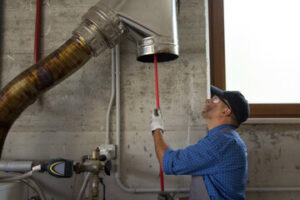The job of a chimney sweep is to remove ash and other debris from a chimney. They do this by using the difference in pressure created by a hot column of gas or wood to create a draught. This air is drawn through the chimney over the coals and wood. The chimney may be a simple straight line or contain many twists and turns.
Chimney Sweeps Charleston SC were notoriously dangerous jobs. Often they were forced to work before dawn, waking up in the early hours of the morning and climbing up the chimneys with their back, knees, and elbows. The work left them with sore eyelids and diseased lungs, and some even contracted Chimney Sweep Cancer, a painful, fatal disease. The hazardous conditions also posed a threat to children’s health.
Children were forced to work in dangerous conditions, including being confined in chimneys for hours on end. They were often forced to wear dirty blankets and endure positions inside the chimneys that were unnatural for growing bodies. Their lungs were ruined by the soot and creosote they breathed, and they rarely received food or payment for their work.
The perfect age to become a chimney sweeper was around six years old. However, children as young as four were often used for the job. They would shimmy up the chimney with their knees and elbows and use a brush to remove soot. Once the soot was removed, the child would collect it and bring it to the bottom of the chimney for the master sweep to remove.
In some cases, children were taken to be apprentices with master chimney sweeps. Children were kept in their master’s chimneys for up to two years. In return, they received small amounts of money. In some cases, the children were given decent food and baths. Some were also sent to church on a regular basis. Poor master chimney sweeps did their best to keep the children small and healthy, even if they did not have much money.
Chimney sweeps have long-worn protective equipment, which may vary in form and level of detail. Some of these tools can be as simple as a face mask or as sophisticated as a full face mask. However, the use of such protective equipment varies among sweeps in different environments.
This study aims to understand long-term changes in Swedish chimney sweeps’ work tasks and their use of protective equipment. It also aims to better understand the type of fuel chimney sweeps use and their exposure to black soot. The study population included male Swedish chimney sweeps aged 21-69.
The questionnaire was a cross-sectional survey. It included people who were sweeping chimneys, and it covered the years 1975-1999. It also included workers who had cleaned chimneys for ten to twenty years prior to the survey. In addition, chimney sweeps were asked to estimate their time spent cleaning fuel, which could include wood-based fireplaces and pellet boilers. The time taken to clean a chimney may also vary from one sweep to another.
The exposure to soot posed a serious health risk to chimney sweeps. This toxic substance can be inhaled, ingested, or absorbed through food. Exposure to this substance may cause respiratory diseases and delayed onset cancer.
It is important to hire a professional chimney sweeper when you notice an animal in your chimney. Chimney sweeps have the experience and tools necessary to safely remove animals from your home. In addition to removing debris, they will inspect the chimney and identify damages that animals may have caused.
Animals that live in chimneys can cause an unpleasant odor and can leave behind urine and droppings. This could cause an overpowering odor in the home. Animals that have died in the chimney can also be a source of bad odor. A chimney sweep will be able to remove any dead animal or bird from the chimney safely and humanely.
In addition to animal infestations, animal nests and other types of animal nests may pose a serious health risk. Not only can these animals carry diseases and parasites, but they also create a fire hazard. Getting rid of animal nests and animal droppings is important for your family’s safety and health.
Birds and animals are often attracted to chimneys because they are warm and safe places. Unfortunately, their nests can clog the chimney and prevent gas flow. This can pose a fire hazard and lead to carbon monoxide poisoning. To protect your family, you should contact a professional chimney sweep to safely remove these unwanted visitors. The company will also install a chimney cap to protect your chimney.
